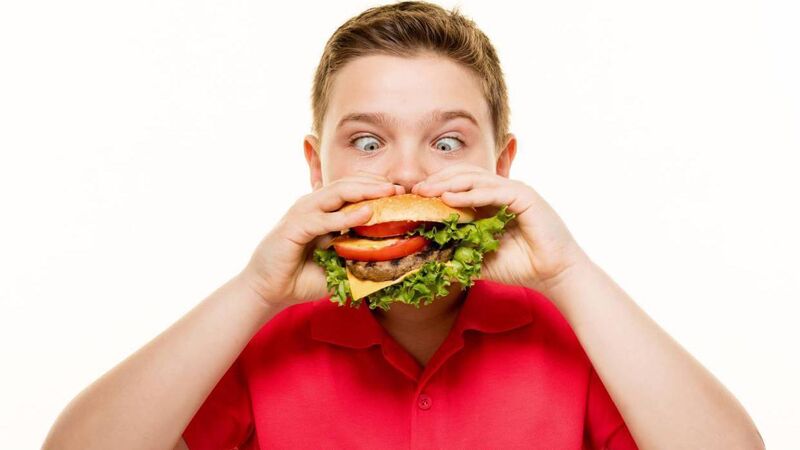Fix the food system to tackle obesity among adolescents

Dr Órla Walsh, who is also a specialist in adolescent medicine at Children’s Health Ireland, reports she has seen an alarming rise in children with chronic symptoms of the disease in the last six years.
“I’m doing a medically led complex obesity clinic and my clinic is the tip of the iceberg,” she said.
“Lives are affected every day and multiple aspects of their physical and psychological health are affected by the disease,” Dr Walsh said, adding that we’re bombarded constantly by advertising for food.
When you leave your desk, ignoring the soggy sandwich in the bottom of your bag, to pick up a spicy chicken roll, a packet of crisps and diet cola across the street, what are you actually doing?
Deciding to have your lunch. Freely choosing, despite that guilty whisper inside your brain berating you for your poor decisions and lack of willpower - to give in to your inner yearnings over and over again.
Henry Dimbleby in his book Ravenous (2023) disagrees. Here’s why.
“You are not alone. You are certainly not free. You are part of a system so vast, so complex, so powerful, and so intimately woven into everyday life that you hardly know it’s there.
Successive governments have failed to deal with a profit- driven unhealthy food environment. Fear of unintentionally creating new problems, pressure from the food industry, public scepticism, and a cynical media ready to punish any whiff of nanny-statism have combined to stymie successive governments.
Even as the country grows fatter and sicker and the costs to the HSE get increasingly unmanageable, politicians are afraid to act.
All-island body, Safefood is stepping into the ring with a five-year public health campaign, ‘Building a healthier food environment’ that aims to raise awareness of the unhealthy food milieu, how this is harmful to children’s health, and why it needs to change.
The food environment has changed radically in recent decades. We fail to register that eight of the top ten selling food brands in Ireland are unhealthy food and fizzy drinks.
More than half (56%) of the foods on promotional offer in convenience stores are unhealthy, with almost two in three (63%) pre-school children instantly familiar with brand logos of the top selling food products.
Children from disadvantaged areas are more vulnerable, with far higher numbers of fast food outlets in their areas than more affluent ones.
Gary A. Kearney, Chief Executive, Safefood, states that it’s very difficult to make healthy food choices when faced with constant advertising and marketing, and the availability of cheap, unhealthy foods at every turn.
“Over the next five years, we will draw upon the latest and emerging research in this area and work with our many partners with a view to building a healthier food environment and protecting our children’s health,” he said.
The goal of this campaign is to radically alter the constant consumer demand for unhealthy food towards one that does not compromise on access to cost-effective nutritious food - a demand that will expedite the changes needed to build a healthier environment.
What does this look like in practice? This is one area where the UK is one baby step ahead of us.
In October, 2022, the UK government introduced regulations on food promotion and placement in England, which gave trading standards or environmental health officers powers to fine large supermarkets if they put some foods high in fat, salt or sugar (HFSS) in prominent locations.
Director of the Obesity Health Alliance (OHA) in the UK, Katherine Jenner said in December, 2023, that despite some breaches, it was encouraging that most supermarkets had taken sweets and sugary treats away from check-outs.
“This shows that regulations can help make the healthy choice the easy choice for everyone,” she said.
The rules only apply to larger retailers with more than 50 employees or in stores larger than 2,000sqft, roughly the size of a tennis court.
Imagine being able to walk into your local supermarket without having to wade through biscuits, chocolates, sweets and fizzy drinks physically assaulting every one of your senses as you negotiate your way to the bread and milk or vegetables for dinner on your way home from work.
And there are promising signs that the legislation is working. Lead director of public health at the UK group Food Active, Prof Matthew Ashton said the policy had huge potential to create a healthier environment for local communities.
“This report shows it has started to have a positive impact by shifting the amount of less healthy options away from the checkout and other key areas of the store towards more healthy options being visible,” he said.
Why are we not introducing similar legislation here? The Public Health (Obesity) Bill promised in the current programme for government in 2020 has yet to be introduced. Yet it would be a giant step in regulation for a healthier food market.
This includes an online ban on the marketing of unhealthy food and drink, a ban on unhealthy advertising on state-owned transport, buildings and public infrastructure; regulations for no-fry zones for all new fast food outlets near schools; and the banning of ads for unhealthy food and drinks within 200m of school playgrounds.
The simplest step is the mandatory removal of all HFSS foods from end-of-aisle and checkout counters, a ban on buy-one-get-one-free offers on HFSS goods, and a ban on nutrition and health claims on these products.
Safefood is right on the button with this campaign. By starting the conversation with parents and consumers, they are asking us all to think about how our choices are being manipulated by a global food market that is concerned not about our health but about one thing - maximising profit and market share.
Environmental campaigner George Monbiot, in The Invisible Doctrine (2024), reassures us that just as a financial system or an ecosystem can flip suddenly from one state of equilibrium to another, so can societies.
“It has happened many times before: sudden sweeping changes have taken place, though they seemed unimaginable shortly before they happened,” he wrote.
Think of smoking. Not long ago, smoking in public places was acceptable almost anywhere. Similarly with sweeping changes in sexual liberation, marriage equality, the #MeToo movement. Advocates and campaigners gradually expanded the concentric circles of people who were committed to new beliefs and practices, until they reached a critical threshold, at which point change cascaded suddenly and unstoppably.
“Observational and experimental data suggests that once 25% of the population are committed to change, most of the rest of society quickly joins them,” states Monbiot.
This is what we need to happen with the food environment to ensure healthy foods are prominently displayed at eye- level for children in supermarkets, restaurants, leisure centres, swimming pools, play centres - wherever children hang out.
Dr Catherine Conlon is a public health doctor with the HSE in Cork.







 App?
App?




